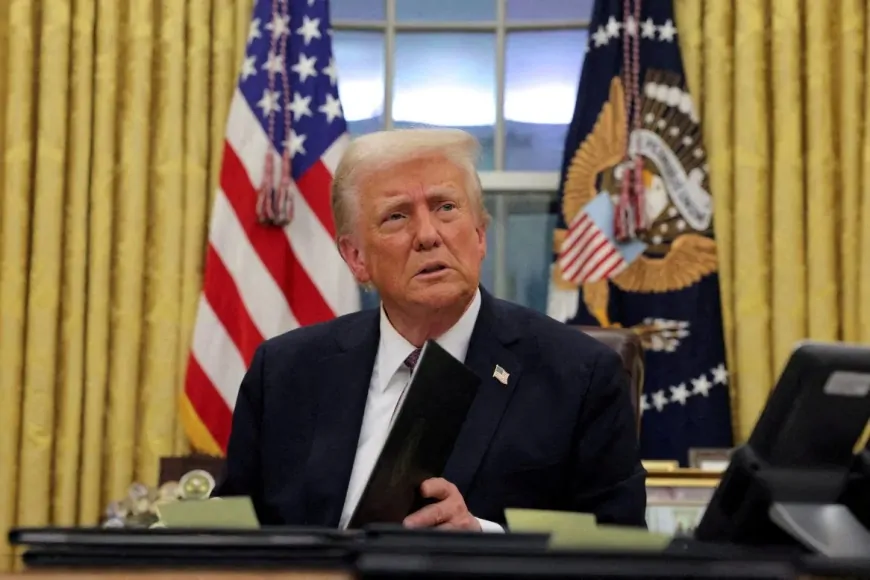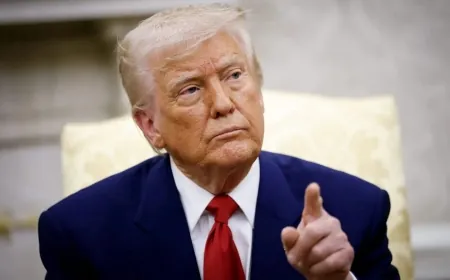Trump Signs Reciprocal Tariffs Order: Japan and Other Nations Face New Trade Challenges
Trump’s new executive order on reciprocal tariffs targets countries like Japan, China, and Mexico. Learn how it impacts U.S. trade, tariffs on steel, and auto imports starting April.

President Donald Trump has signed an executive order paving the way for reciprocal tariffs. This means that the U.S. will impose tariffs on countries that impose high tariffs on American goods. Trump has long used tariffs as a tool to press foreign countries into better trade deals, and now, he’s doubling down on this strategy.
Starting in April, the administration plans to review each country’s trade policies and apply tariffs that mirror the duties those countries charge on U.S. products. This could affect many of the U.S.’s largest trading partners, including China, Canada, and Mexico. Trump's latest move also comes on the heels of his recent 25% tariffs on steel and aluminum imports, which have already sparked tension between the U.S. and its global allies. Critics worry that this approach could lead to higher prices for consumers and slow economic growth, but the President is standing firm.
Japan Pushes for Exemption
Among those concerned about the new tariffs is Japan, which is seeking an exemption from the reciprocal tariff plan. Japan’s foreign minister, Takeshi Iwaya, made a direct appeal to U.S. officials, urging them not to apply these new tariffs to Japan. The nation’s automobile industry, as well as its steel production, would be hit hard by the tariff increases. Japan hopes to avoid the financial strain other countries might face under the new rules. As the U.S. and Japan continue their trade discussions, the outcome could have a significant impact on global trade dynamics.
New Auto Tariffs Set to Arrive in April
In addition to steel and aluminum, President Trump is now turning his attention to the auto industry. He has confirmed that starting in April, new tariffs will be placed on foreign-made cars coming into the U.S. While he hasn't specified the exact tariff rate, the move is expected to target major car manufacturers from Japan, Germany, and South Korea. These countries are home to some of the world’s largest automakers, and the tariffs could have a major effect on the U.S. car market, which relies on imported vehicles for nearly half of its sales.
Trump’s goal with these tariffs is clear: he wants to push foreign companies to shift their production to the U.S. But with so many U.S. consumers relying on foreign-made vehicles, the new tariffs could lead to higher prices at dealerships and potentially strain the domestic auto industry.
India Eases Tariffs on U.S. Bourbon Whiskey
In a sign of shifting trade winds, India has recently slashed its tariffs on bourbon whiskey from 150% to 100%. The decision comes after President Trump and Indian Prime Minister Narendra Modi held talks on trade. While it might seem like a small gesture, the move is seen as a step toward mending trade relations between the two countries. Trump has been vocal about his frustrations with India’s high tariffs, and this change is a sign that the two leaders are finding common ground.
What’s at Stake with Reciprocal Tariffs?
Trump’s decision to move forward with reciprocal tariffs could have big consequences for both the U.S. economy and global trade. Instead of blanket tariffs on all countries, this new approach is more targeted, looking at each nation’s individual trade practices. It could lead to retaliatory measures from other countries, potentially escalating into a trade war.
While some believe these tariffs will protect U.S. jobs and encourage companies to bring manufacturing back to the U.S., others worry about the price tag for consumers. Higher tariffs often mean higher prices on goods, which could hurt American shoppers and businesses alike. It’s a delicate balance, and the ripple effects of these tariffs could be felt for years to come.
No Exemptions: Trump's Stand on Tariffs
One thing is clear: no country will be exempt from these new tariffs, not even major U.S. companies like Apple. During his first term, Trump allowed Apple to bypass some tariffs on products made in China, but now, he’s reversing that stance. The new tariffs will apply to all, regardless of past exemptions or relationships. This firm approach reflects Trump’s broader philosophy that the U.S. should not be at a disadvantage when it comes to global trade.
What Will the Future of Trade Look Like?
As the world watches, Trump’s new tariff strategy will undoubtedly reshape global trade. The upcoming months will be critical in determining how countries like China, Japan, and Mexico respond to the new measures. The potential for trade disputes to escalate is high, and the U.S. economy may face inflation as a result. If prices rise, the Federal Reservemay adjust interest rates to counteract the effects, further complicating the situation.
At the end of the day, Trump’s trade policy is a gamble. While it might strengthen certain U.S. industries, it also carries risks. As trade talks continue and the new tariffs take effect, it will be important to watch how the situation develops, and whether this approach will lead to the global trade deals Trump envisions.
Also Read: Modi and Trump Sign Deal to Make US India's Main Oil and Gas Supplier































































